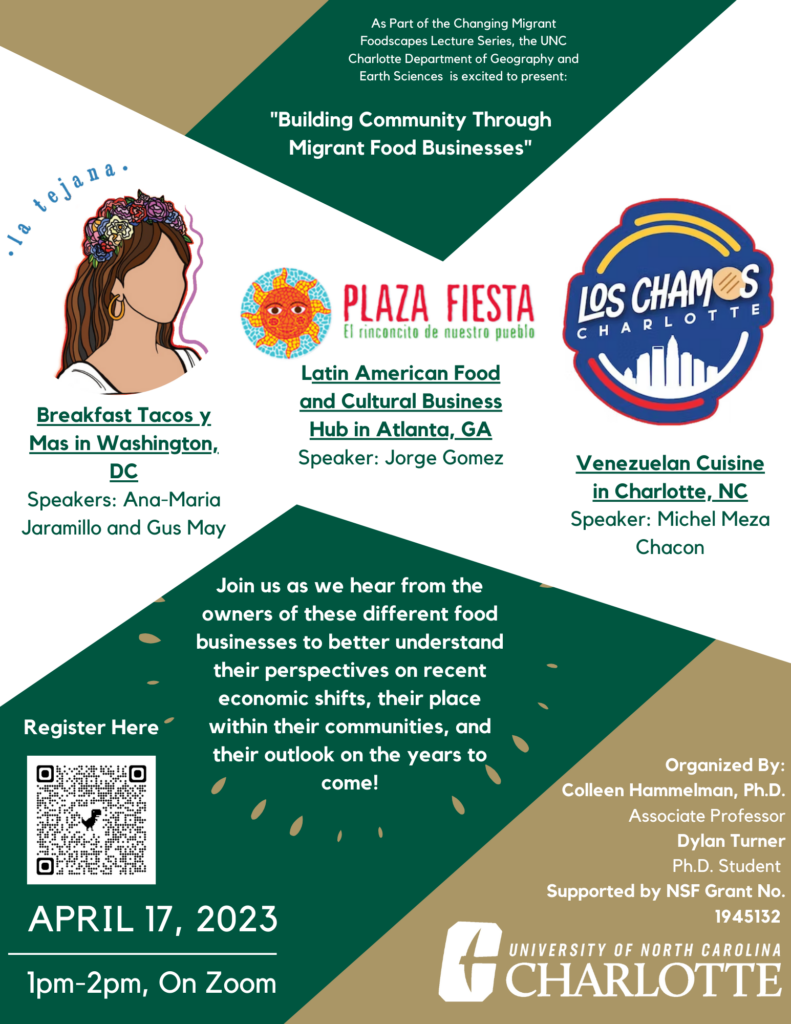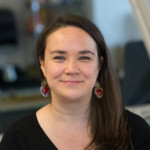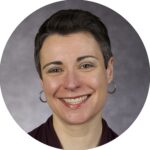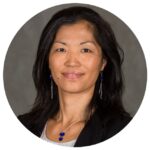The Gentrification in Migrant Foodscapes speaker series aims to produce collective intellectual engagement with literature and practice in the fields of retail gentrification, migration, and food studies. The series involves two speakers per year hosted by Dr. Colleen Hammelman or a research partner at one of the three field sites – Charlotte, Atlanta, and Washington DC – and webcast to all participating partners.
2025 Speakers
Salvadoran Immigrant Communities in the Nation’s Capital: A Brief History
In this talk, Dr. Patrick Scallen presented Salvadoran Immigrant Communities in the Nation’s Capital: A Brief History in which he talked about Salvadoran migration to Washington D.C., its evolution and transformation in the context of US Cold War foreign policy and domestic immigration policy, how they adapted to and adopted Washington, and current struggles to survive and flourish in a rapidly changing capital city.
Watch the recording here.
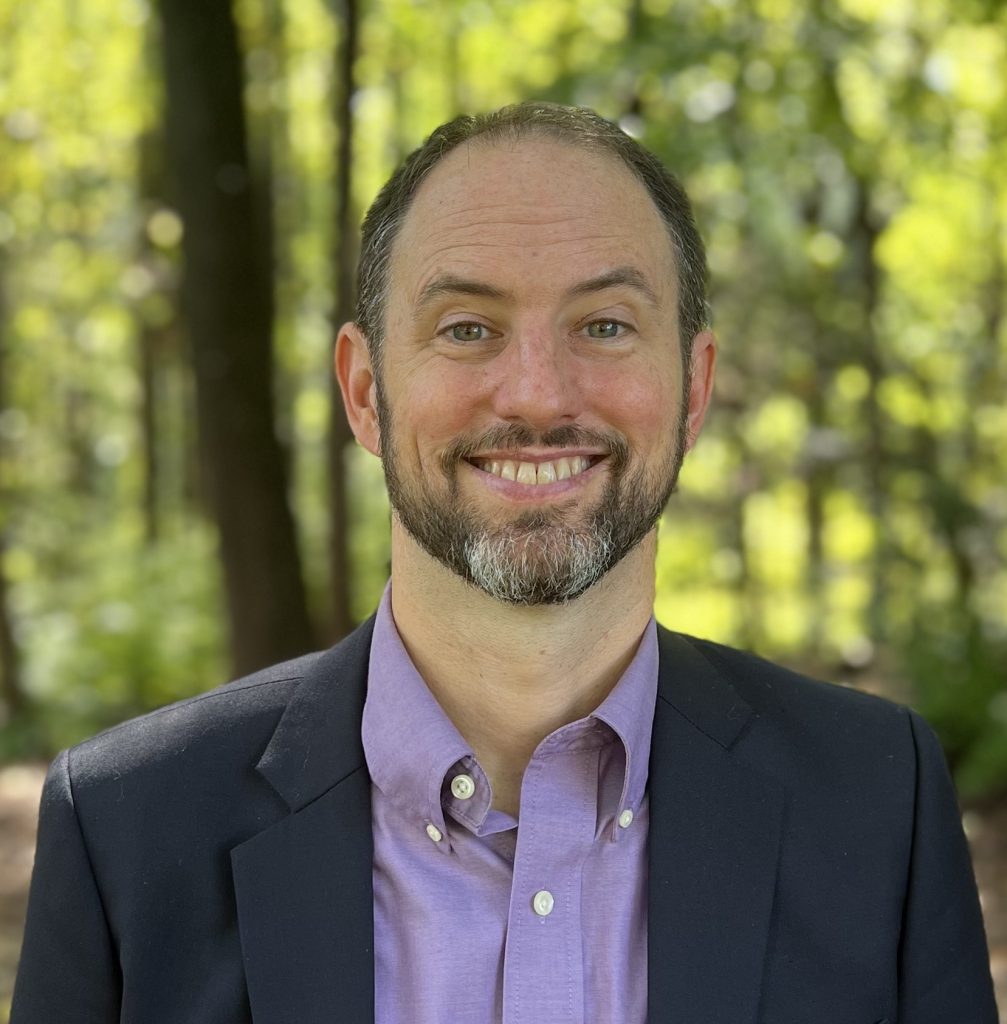
Patrick Scallen is a community-based historian and educator who teaches US and DC Latinx History in the Department of History at Georgetown University. He is the former editor of Washington History magazine, the peer-reviewed journal of the history of our nation’s capital. He has lived, researched, and worked in both Latin America and the District of Columbia for the past 20 years and writes on immigration history, ethnic history, and urban social history in Washington, DC – specifically the history of Salvadoran immigrant communities. He previously served as lead researcher and curriculum developer at the Smithsonian National Museum of American History and as archivist for the Latino DC History Project at the Smithsonian Latino Center (now the National Museum of the American Latino). He holds a PhD in History from Georgetown University, an MA in Latin American Studies from Tulane University, an MAT in Education from Brown University, and a BA in History from Xavier University.
2024 Speakers
City Government and Migrant Food Businesses
In this talk, Maura Chavez and Erin Gillespie talked about their experiences supporting migrant food entrepreneurs as employees of the City of Charlotte.
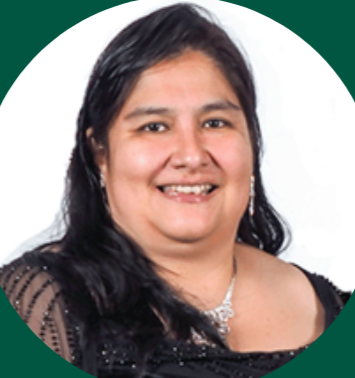
Maura Chavez is one of two Community Coordinators in the Community Affairs division, she has created programming that enhances a partnership with Community Relations and the Charlotte-Mecklenburg Police Department, while introducing community-based training modules and conflict resolution life skills to middle school girls. As a long-time Charlottean, Maura has first-hand knowledge and lived experience of Charlotte’s Latinx community and how its changed over the years.

Erin Gillespie is the interim Executive Manager for the City of Charlotte Corridors of Opportunity program. She leads a cross-departmental team to advance the City’s goals for six priority corridors through equitable development and community-driven strategies. Erin has been with the City of Charlotte for over five years, leading place-based economic development initiatives including the City’s Business Matching Grant Program and City’s Main Street commercial district strategies.
F**k California: New Geographies of Gentrification-Induced Migration in U.S. Cities
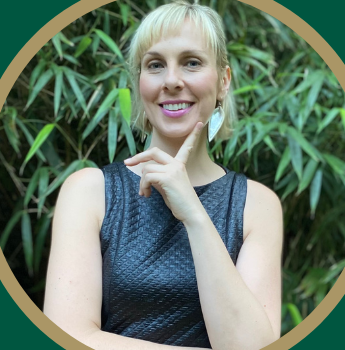
In this talk, Nina Martin discussed how Raleigh-Durham-Chapel Hill (“the Triangle”) has become one of the largest receiving cities of gentrification-induced migrants. As the triangle is growing, it is reproducing the high prices, environmental harm, and loss of sense of place migrants experienced in their city of origin.
Nina Martin is an Associate Professor of Geography & the Environment at the University of North Carolina at Chapel Hill. She holds degrees from McGill University, the London School of Economics, and the University of Illinois at Chicago. Here research areas include urban politics, economic and community development, and immigration. Her work has been published in journals such as Urban Geography, Journal of Urban Affairs, and International Journal of Urban and Regional Research. Her current project is called “Pretentious Cities: How Progressive Cities Recreate Urban Inequities”. She serves on the Durham Workers’ Rights Commission.
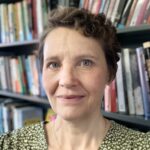
2023 Speakers
The $16 Taco: Contested Geographies of Food, Ethnicity, and Gentrification
In this talk, Dr. Pascale Joassart-Marcelli shared research from her recent talk, The $16 Taco, on the role of food in transforming urban landscapes. Dr. Joassart-Marcelli is Professor of Geography, Director of the interdisciplinary Food Studies and Urban Studies programs, and Founding Director of the Center for Better Food Futures at San Diego State University.
Watch the recording here.
Building Community through Migrant Food Businesses
In this online event we talked about breakfast tacos y mas in Washington, DC, with Ana-Maria Jaramillo and Gus May, owners of La Tejana, and Latin American food and businesses in Atlanta, GA, with Jorge Gomez, previously at Plaza Fiesta.
Watch the recording here.
2022 Speakers
“Life on the Other Border: Farmworkers and Food Justice in Vermont“
This talk presents Dr. Mares’ findings from more than 7 years of ethnographic research on food access amongst the Latinx farmworker community in Vermont, arguing for the necessity of community-based applied research and shedding light on a border region that is often misunderstood and underexamined. Recording is available here.
Teresa Mares is an Associate Professor of Anthropology at the University of Vermont and is Director for the Graduate Program in Food Systems. She received her M.A. (2005) and Ph.D. (2010) in Sociocultural Anthropology from the University of Washington. Dr. Mares’ research focuses on labor in the food system, food security and food sovereignty, and migration from Latin America. Analytically, Dr. Mares engages with theories and concepts of citizenship and borders, identity and foodways, and social movements. Her first book, Life on the Other Border: Farmworkers and Food the Other Border: Farmworkers and Food Justice in Vermont, was published by University of California Press (2019). She is currently working on her second book (with co-author Laura-Anne Minkoff-Zern) entitled Will Work for Food: Labor Across the Food System.
COVID-19 Pandemic Physical, Emotional, and Economic Impact on Migrant Communities: Evidence from Charlotte (NC) and Atlanta (GA).
The COVID-19 pandemic has exacerbated pre-existing inequities across the US and made more visible socio-economic gaps and health disparities among different groups in the population. Specifically, migrant communities (especially Latinx communities) have emerged as one of the most impacted groups. This speaker event explores the multifaceted impact of the COVID-19 pandemic on migrant communities in two US southeast cities. Leaders from two organizations, the Camino Health Center in Charlotte and We Love Buford Highway in Atlanta, will share about the impacts their communities have experienced and how their organizations have pivoted in response to the pandemic. Recording is available here.
Lily Pabian, Executive Director of We Love Buford Highway, Atlanta (GA)
We Love Buford Highway is a nonprofit organization committed to preserving the multicultural identity of Atlanta’s Buford Highway, a multiethnic corridor in the northeastern part of the Atlanta metro area. Lily will discuss the impact of the COVID-19 pandemic on communities tied to the Buford Highway area and efforts to pivot back to their storytelling roots as an important advocacy strategy for preservation.
Lennin Caro, Research Assistant at Camino Research Institute, Charlotte (NC).
Lennin will discuss findings from a recent study on the physical, emotional, and economic impact of the COVID-19 pandemic on Latino communities in and around the Charlotte area.
This event was supported by NSF Grant No. 1945132, the Migration Research Network, the Office of Interdisciplinary Studies, and the Urban Studies Minor at the University of North Carolina at Charlotte.
2021 Speakers
Just Green Enough: Contesting Environmental Gentrification
Winifred Curran, Ph.D.
Professor of Geography
DePaul University
While global urban development increasingly takes on the mantle of sustainability and “green urbanism,” both the ecological and equity impacts of these developments are often overlooked. The “just green enough” strategy uncouples environmental cleanup from high-end residential and commercial development by focusing explicitly on social justice and environmental goals as defined by local communities, those people who have been most negatively affected by environmental disamenities, with the goal of keeping them in place to enjoy any environmental improvements. Recording is available here.
Beginning from the South: International migration, theoretical frameworks, and methodologies
Jamie Winders, Ph.D.
Professor of Geography
Syracuse University
What happens to understandings of international migration when we begin from the South – in this case, the US South? How are migration theories, concepts, and frameworks reconfigured, reinforced, or altogether rejected when they are operationalized, not in the global cities where most migration scholarship focuses, but in non-traditional immigrant destinations across the US South? This presentation reflects on these questions through the lens of my work with the journal, International Migration Review. Recording is available here.
Urban Agriculture Pivot during the COVID-19 Pandemic
Yuki Kato, Ph.D.
Assistant Professor of Sociology
Georgetown University
The sudden disruption caused by the social and economic restructuring in response to the COVID-19 pandemic in the early months of 2020 affected urban agricultural practices in unexpected ways. Dr. Kato’s talk examines how different forms of urban agriculture adapted to the rapid changes and unfolding situations in Arlington, VA, and Washington, DC. Recording is available here.
